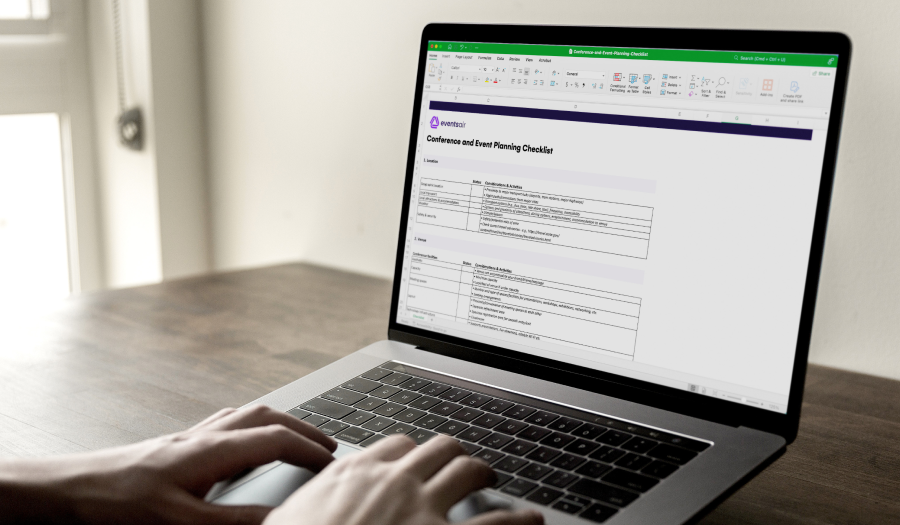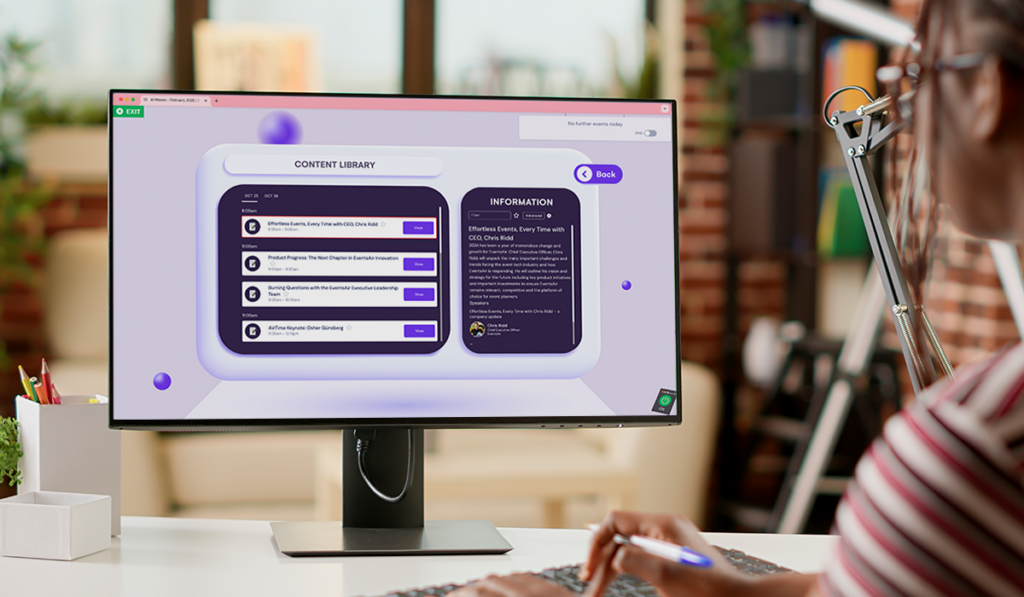Virtual event marketing: 11 Strategies to boost conversion

In today’s digital-first era, targeted and data-driven marketing of any virtual event, using digital channels, is essential for reaching and engaging your target audience effectively. In fact, it’s fair to say that you can’t market a virtual event without employing a range of digital marketing tactics!
This guide explores 11 strategic ideas to enhance your virtual event marketing, ensuring you connect with your audience on a more personalized and intimate level. From social media and SEO-optimized website content to email marketing campaigns and paid digital ads, we’ve got you covered.
What is virtual event marketing?
Virtual event marketing is usually underpinned by a “digital-first strategy” to promote, engage and connect with the target audience of your next virtual event. It also applies to hybrid events, which have a virtual component.
A virtual event marketing strategy is a great choice for events of all types, including webinars, virtual conferences, online workshops, or live streams. Whatever the format, leveraging various digital marketing channels (such as social media, SEO-optimized website content, email marketing campaigns, and paid digital ads such as Google Ads) is key.
While traditional (or offline) event marketing strategies are still very useful, virtual event marketing is particularly instrumental in collecting valuable data on attendee engagement, preferences and behavior. This data-driven insight will help you to tailor your content, improve the attendee experience and enhance overall marketing strategies. Overall, you’ll foster a more personalized and intimate connection with your audience.
11 Ideas for your virtual event marketing strategy
To maximize the benefits of a virtual event marketing strategy, it is essential to market your event to a broader audience. This means using a greater variety of channels and getting creative about your marketing approach.
Here are some strategy ideas to help you market your next virtual event with success.
1. Audience insights lead the way
Whether you’re marketing a virtual event, hybrid event or in-person event, the golden rule remains: understand your target audience, inside and out. This principle is even more crucial for virtual events, where captivating a remote audience demands precision and personalization. By adopting a targeted marketing approach, you not only conserve resources but also ensure your efforts are directed efficiently, reaching those most likely to engage with your event.
The initial step in mastering how to market a virtual event involves deep diving into audience research to discern which digital habitats your target audience frequent. This selective focus allows for a more concentrated marketing effort, rather than scattering resources across the vast digital landscape in hopes of reaching the right ears.
Before launching into promotional mode, it’s essential to integrate with your identified community in a respectful way. Rushing to market your virtual event can come off as insincere. Instead, dedicate time to engage genuinely in existing conversations and contribute valuable insights. This patient, relationship-first approach paves the way for more receptive audiences.
Once you’ve woven into the community fabric, it’s then time to offer them exclusive deals or content. Special promotions, tailored for specific communities, not only reward engagement but also amplify anticipation and exclusivity around your event.
To further improve your reach, targeting tools on social platforms such as Facebook, X and Instagram can make your marketing efforts more precise. These tools allow you to pinpoint your promotions, ensuring they appear before the eyes most likely to appreciate and act on them.
2. Leverage your event website
A proper event website or landing page acts as the cornerstone of your event’s digital presence and marketing strategy, providing a centralized hub for all information and engagement. It not only serves to inform but also to excite and convince potential attendees of the value of your event. A well-crafted site enhances the attendee experience from the outset, offering clear, compelling reasons to participate while simplifying the decision-making process of whether to register for your event
Your event website should include the following key features:
- A compelling headline, to capture attention and succinctly convey the event’s purpose and value
- Date and timing, including relevant time zones to cater to a global audience
- Event agenda, so attendees can plan their participation
- A brief overview of the event, providing a snapshot of what attendees can expect
- Sponsor and partner details, to acknowledge support and add credibility
- Guest speaker information, highlighting expertise
- Frequently Asked Questions (FAQs)
- Brand imagery to support your message and add visual appeal
- A short video can generate excitement and showcase highlights or what’s to come
- Customer/attendee testimonials from previous events, to build trust
- Incorporating these elements ensures your event website resonates with potential attendees, providing all the necessary information and excitement to drive registrations.
3. Campaign timing is key
Launching your event’s digital marketing campaign at the optimal moment is crucial for the best outcomes. Timing can significantly influence the reach and impact of your promotional efforts, directly affecting attendee engagement and overall event success.
Early promotion can generate buzz and anticipation, and helps your audience to plan ahead. However, timing this too far in advance might lead to interest waning over time. On the other hand, leaving your campaign too late and you won’t give your audience enough notice, leading to lower event registration numbers.
For maximum visibility, better engagement and higher conversion rates, we recommend timing your virtual event marketing campaign during peak online activity periods of your target audience. You could build momentum through phased content releases, keeping the audience engaged and excited. This might include program and speaker information, as well as behind-the-scenes videos and customer testimonials.
Additionally, aligning your campaign launch with related industry events or trends can increase interest and capitalize on an already excited, attuned audience.
4. Continue marketing during and after your virtual event
When you’re planning how to market your virtual event, your efforts shouldn’t stop at kickoff. You should also look to harness the momentum of live interactions and post-event engagement to maximize impact.
During the event, live posting on social media channels captures real-time excitement, reaching those unable to attend and encouraging last-minute registrations. You could even send in-event reminders to keep your audience tuned in to upcoming sessions or features. Offering exclusive content or perks to participants fosters a sense of exclusivity and value, as well as encouraging real-time engagement and sharing.
Post-event, your virtual event marketing strategy should shift towards sustaining interest and leveraging success for future events:
- Email communications recap key moments and express gratitude, keeping the connection alive
- Uploading event content to your website or platform allows continued access, extending the event’s lifespan
- Social media platforms buzz with highlights, amplifying reach and engagement
- Lead nurturing through targeted follow-ups converts interest into action
- Sharing event satisfaction through testimonials or surveys showcases success and gathers feedback.
5. Maximize your social reach
Social media is arguably the most powerful tool in our arsenal of strategies on how to market a virtual event. These dynamic platforms offer unique opportunities for reach, engagement and even the opportunity to “go viral”. All these elements are crucial for the success of any virtual event.
Here are some of our favorite social media event marketing strategies:
- Creating a consistent hashtag for your event can unify conversations, making it easier for attendees to follow and contribute to the buzz
- Leveraging stories and live features on platforms like Instagram and Facebook allows real-time engagement with your audience. You could consider offering sneak peeks, behind-the-scenes glimpses, or live Q&A sessions to pique interest and maintain excitement
- Engaging influencers or industry leaders to share your event can dramatically extend its reach to a wider, yet targeted, audience
- Crafting shareable content, such as visually appealing graphics or compelling video teasers, encourages your audience to spread the word within their networks
- Finally, scheduling regular updates and countdowns maintains momentum and keeps your event top-of-mind.
For data-driven event marketers, social media analytics tools will help you track engagement and adjust strategies in real-time. This ensures that your efforts in learning how to market a virtual event are not only strategic but also data-driven, maximizing impact and attendee turnout.
6. Virtual event email marketing
Some event marketers mistakenly believe that email is a thing of the past when, in fact, the power of a good email list cannot be understated, particularly when it comes to marketing your virtual event.
Email marketing offers a direct and personalized pathway to engage potential attendees. Its effectiveness lies in the ability to segment audiences and tailor messages to fit various interests and behaviors, ensuring relevancy and increasing engagement (and hopefully, driving event registrations).
Starting with a compelling subject line is crucial. It acts as the first impression and decides whether your email gets opened or skipped. You should then follow up with engaging content that highlights the unique value and key details of your event, such as speakers, agenda and exclusive offers.
Consider nurturing interest and maintaining excitement in the lead-up to the event with a multi-touch email marketing campaign. Initial announcements, followed by regular updates and last-minute reminders, keep your event at the forefront of recipients’ minds. Personalization, by including the recipient’s name or even content tailored to their past interactions with your brand, can enhance the connection and encourage conversion.
Integrating clear calls-to-action (CTAs) within your emails simplifies the registration process, directly funneling potential attendees from interest to action.
Analytics will help you understand the performance of your email campaigns, based on key metrics including open rates, click-through rates and conversions. This will help you refine your virtual event marketing strategy, ensuring maximum reach and engagement in the future.
7. Virtual event SEO
Search Engine Optimization (SEO) is an incredibly useful tool to market a virtual event. This will increase your event’s visibility in organic search results, attracting more eyeballs and registrations.
Start by optimizing your event page or website with relevant keywords related to your event topic, speakers and industry. Incorporating these keywords naturally within your content, meta descriptions and titles can significantly improve your search rankings.
Use Google’s keyword planner to find out what keywords your target audience uses to search for events they are interested in and craft your content to include these keywords so your event will appear in their Google search results. Be careful to avoid keyword stuffing.
Another effective strategy is to aim for rich results in search engines. Structured data markup on your event page allows search engines to display detailed information about your event, such as date, time and location, directly in search results. This strategy not only makes your event more noticeable but also provides potential attendees with useful information at a glance, making it easier to engage with your content.
8. Traditional and digital PR for virtual events
Public Relations (PR) should also be part of your strategy to market your next virtual event – both traditional PR, and digital PR (that is, using digital channels to promote your message).
The best PR starts with a well-crafted press release, providing media outlets with all the necessary information about your event in a concise and engaging manner. This should include the event’s purpose, key speakers, how attendees can benefit, plus anything unique or newsworthy that might catch a news outlet’s eye.
The next step is to undertake outreach to industry publications and websites. This will not only increase visibility but also enhance the event’s credibility through association with respected industry voices.
Finally, as mentioned earlier, collaborating with influencers within your industry can amplify your message further. Influencers can reach vast audiences through their platforms, offering personal endorsements that can resonate more effectively than traditional advertising.
9. Attendance incentives
It’s human nature to respond to incentives and rewards, so use this to your advantage when you’re thinking about how to market your next virtual event. Here are some of our favorite incentive ideas:
- Offer access to exclusive content or benefits, such as special sessions with keynote speakers or downloadable resources
- Time-gated benefits and early bird tickets can motivate your audience to act quickly to secure their spot
- Competitions with attractive prizes for sharing the event and referral schemes for ticket discounts can help foster audience-generated marketing, particularly on social media
- Free merchandise always works well as a lure for early registration, as well as driving anticipation and excitement.
10. Make it easy to buy tickets and offer options
Virtual and hybrid events are great for the variety of registration options they allow – this means you can extend your reach and your bottom line. In addition to the usual ticket tiers (early bird, bundles, single day or entire event, block bookings, or VIP tickets), you can also offer access to recordings of presentations after the event.
Your event management software should allow for dynamic, customized registration experiences. This allows you to not only capitalize on these tiers, but ensures you’re always creating personalized, and streamlined, registration experience for your attendees – no matter what ticket type they’re purchasing.
11. Virtual event marketing analytics
Our final tips for marketing your next virtual event is measure, measure, measure – and report.
Event analytics will help you measure the success of your virtual events, as well as your marketing efforts, by analyzing a blend of quantitative and qualitative metrics, including:
- Registration and check-in rates offer initial insights into the event’s reach and the effectiveness of promotional efforts
- Audience engagement metrics, such as time spent at the event, participation in polls, and interaction in Q&A sessions, reveal the level of attendee involvement and satisfaction
- Social media analysis can gauge the event’s buzz and audience expansion through shares, likes, and mentions
- Post-event surveys provide direct feedback on attendee experience, highlighting strengths and areas for improvement
- Finally, assessing financial indicators including revenue v cost will help you understand whether the event was a success from a commercial perspective.
Plan and market your next virtual event with EventsAir
If you’re planning a virtual or hybrid event and would like to create an engaging and seamless experience for your remote attendees, consider EventsAir’s virtual and hybrid event support services. Whether you need help to develop a virtual marketing plan, or develop a remote attendee portal, an event producer, or anything in between, we have solutions to manage all the behind-the-scenes work for your virtual and hybrid events.
We have one simple mission: to help event planners deliver the WOW in their events with the world’s most powerful event management technology. We’ve delivered some of the world’s biggest events, and we’d love to help you too.
If you would like to understand how we can help you amplify your event marketing and promotion for your next event then schedule a demo with one of our team members today.



